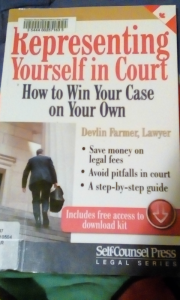
(How to Win Your Own Case, by Devlin Farmer)
This is basically an instructional book written in 2015 for those wishing to represent themselves in court.
Unlike An Advocacy Primer, covered in September, the Farmer book contains much more basic information, and is much more simplified. It assumes that the readers have little to no knowledge about how the court proceedings work, and is a lot more reader friendly.
An interesting Supreme Court ruling, Pintea v. Johns, came out in 2017. It codified the obligations of Justices, Judges, Masters, and Deputy Judges to ensure that self-represented litigants are getting fair treatment in court. In fairness to the author, it was 2 years after the book was published.
A Brief Outline of The Book
Part 1: Alternatives to court
Part 2: Learning the law
Part 3: Filing
Part 4: Lawyers
Part 5: Discovery
Part 6: Motions and temporary orders
Part 7: Pre-trial prep
Part 8: Trial proceedings
Part 9: Witnesses
Part 10: Exhibits
Part 11: Closing arguments
Part 12: Intro to appeals
By no means does the book actually prepare someone for the court. However, by explaining what is happening and why, the self-rep is able to prepare him/herself and more thoroughly understand the process.
The book is written a very basic level, yet contains a wealth of information necessary for a potential self-represented litigant to face the court. It also avoid legalese and jargon. As such, it is very readable to anyone with adult reading skills.
This book stays away from specific forms and names, which in this case is a blessing. Better to understand the process more than to be bogged down with memorization.
The book is published by “Self-Counsel Press”, which releases many self-help and how-to books on a range of topics. Overall, they are very readable. They are not tedious or intimidating at all. This publisher releases some very good content.
If you are facing (or initiating) a court case, this book will do well to helping the average reader understand what is happening. At a minimum, if you do choose to get legal counsel at some point, reading this book beforehand will enable you to make better choices. Also, you are less likely to be gouged for fees.
Overall, this is a highly recommended read for anyone with any interest in court procedures.

The problem is that in Canada the lower courts presume men and women are persons. Therefore we are corporations to which a contract and obligation is assumed.
As men and women we don’t represent ourselves, we are ourselves and we present our information. Words and the use of words are important. We make a special appearance by invitation of the Crown Prosecutor and we motion the court to move the issues to a competent jurisdiction, with a counterclaim and Charter Challenge in hand.
The competent jurisdiction is the Superior or Supreme Court where men and women are recognize and where we can enact our inalienable rights as a man or woman, not as a corp. body or PERSON. Charter challenges to uphold our inalienable rights as stated in Section 7 and 26 and supported by ICCPR and UDHR.
Correct me if I’m wrong, I learned that a Lawyer’s allegiance is to protect the court. Further to hire a lawyer is to declare yourself as a child, ward of the state or feeble minded. Lawyers do not teach a man to exit the land of the dead Corps. and live in the land of the living. To do this would be against their oath to protect the court, Government and revenue streams.
Canada is a corporation not a Government. A colonial Crown Corporation just like the US Corp. Tracing back the History, Canada is just an extension or rebranding of the Hudson Bay Corp. Rupert’s Land and their courts and tribunals therefore.